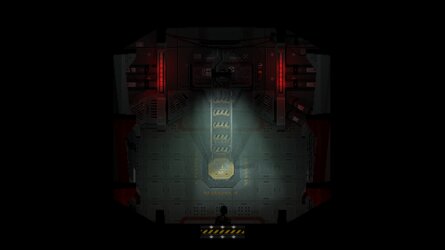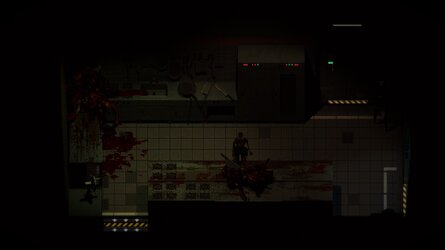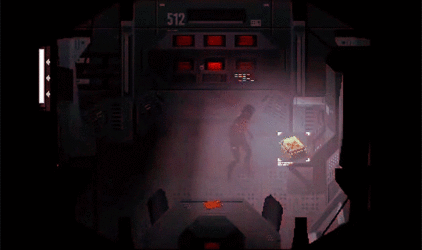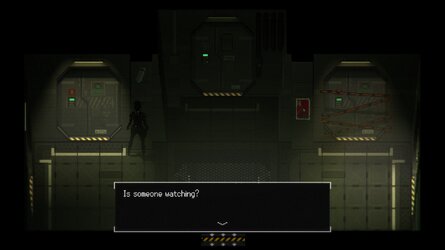- Joined
- Jun 27, 2014
I love me some horror games, Kiwis, and we're undergoing a second renaissance thereof these days, thanks to the fact that the indie market is, in turn, pushing the hand of the AAA space, and while there's some absolutely phenomenal entries that came out recently, one in particular so thoroughly blew my mind that it kind comes into its own: the very first game ever made by its developer (a little company called Rose-Engine), a work of such outstanding quality and care that I could not help but be stunned when I first played it, and even now has managed to surprise me in several ways.
SIGNALIS is a Survival Horror game that leans hard on the Silent Hill side of the spectrum, boasting a decidedly sci-fi aesthetic, and unusual for a horror game, really, really strong worldbuilding.

You play as Elster (Serial Code: LSTR), a female android assigned to a now-crashed Scouting ship, the Penrose-512. You wake from cryostasis, have no fucking idea what's going on, but are guided by a faint remembrance of a promise you were supposed to fulfill. As there's no one on this crashed ship, it falls upon you to explore the tiny vessel, get yourself an EVA suit, and explore where you may have ended up.

Exploring outside leads you to an ominous, clearly not-natural hole in the ground, and exploring this, in turn, leads to a tiny tunnel leading to a radio station terminal. The terminal activates and plays a pre-recorded message, leading to several discordant images and phrases, along with the encouragement to "Wake Up," before.....


You wind up elsewhere, in a bathroom on some base someplace, with no earthly understanding of how you got there. This where the game truly begins, as Elster attempts to figure out what the honey bunches of fuck is going on, try to put together what the messages she remembers mean, and who is in the photograph she found in the game's intro. The game takes a very slow burn early on, setting up atmosphere so thick you could cut it with a knife while at the same time showing you more and more of this game's world. Adding to this, the soundtrack and soundscape are phenomenal, with the music featuring brutal industrial chords for the tense moments, and haunting, elegant melodies when encountering the more introspective moments. When the game kicks up with boss fight music, it's fittingly brutal.
SIGNALIS takes place in a particularly bleak future where humanity has developed Androids and begun exploring the stars, but technology has regressed. The technology used to make the androids in this universe (called Replikas), Bioresonance, has enormous potential, but by focusing so hard on it, their other technologies have been left to languish. With the main government of the setting being a totalitarian dictatorship where all dissent is ruthlessly stamped out, invasive surveillance is everywhere, and humans are treated little better than the androids they work alongside, the main theme of the game is depersonalization and commodification of people. Yet at the same time, the game is underwritten with slower-paced moments hinting at the true message the game is trying to get across - a difficult balance to establish, but one that the game does for the most part.

You see a lot of things like propaganda posters, promotional materials for the various Replika lines, and base communications that will share more about the setting and gradually give you clues. You are going to be thinking in this game - an awful lot, too, considering that none of the fucking puzzles in the game hold your hand, and they can actually be quite challenging. Some may involve simple problem-solving, like using a mechanical lockpick to open a door by switching through templates, and others will be more esoteric, like using your radio to tune in frequencies that will then tell you safe codes. Players that are more for the action won't care for this, but SH fans and those who like to flex the big brain will find themselves loving it. One major item you get that doesn't take up inventory space is the radio reciever, which allows Elster to listen into radio frequencies. At the base, these can have everything from transmitted codes on repeat to polytones on them, and while some are just there to mislead, a surprisingly large amount have hidden meanings squirreled away in them, too.


There absolutely is combat, though. Other Replikas in the base have been corrupted and are seemingly rotting away, becoming masses of metal and tumescent synthetic flesh that act as horrid parodies that they once were. They all act different and require different tactics and firepower to deal with. Some of them are content to mind their own business until you approach, others will aggressively pursue you the second you enter an area. Running from them is an option, and other times you will be better off fighting them. The problem is that putting them down doesn't necessarily mean they are down for good. The gunplay is very Resident Evil-ish, using a laser sight to target enemies. The targetting cursor will shrink as you aim, and when it's fully tightened in, you'll do maximum damage. Ammunition isn't exactly scarce, but you never seem to have as much of it as you'd like to, especially as the game progresses. In addition to weapons, you can equip an offhand item as well - this can be a secondary weapon (like a single-use stun prod), a quick-recovery healing agent, or a flashlight. There's a nice array of different weapons, from a pistol and shotgun to an extremely powerful hunting rifle and more.

Inventory management is a huge part of SIGNALIS. You have only six slots and this never increases. You have to make careful decisions on what to carry and what to leave behind, and decide whether or not it's worth it to strip a room's resources for later. This ironically never gets too restrictive, because item boxes are in every save room, but it also means that you can only carry relatively small amounts of resources at any given time, which does a lot to increase tension. You may find yourself finding ways to lighten your inventory, such as leaving reserve ammo back at a save room (relying on whatever ammo is currently in your weapon) or eschewing carrying healing items, making a lot of these decisions a lot more engaging than they ordinarily would be in a title like this. I know that there's a contingent of users on this forum that ran screaming to the exits the second I said the words "Inventory Management," but the game is intentionally doing something with this mechanic, and it does help heighten the tension.

Despite having some pretty big locations, SIGNALIS is effortless to navigate. The huge amount of attention to detail does a lot to make the areas feel like their own thing, and it never feels like any part of the facility is superfluous or unnecessary. The art direction is absolutely phenomenal here, and one thing that jumped out at me is that for the most part, I thought the environments were 2D, but with 3D props. Then I got the fucking flashlight and saw that every object in dark rooms I was shining it on was casting real-time 3D shadows. Needless to say, this all contributes to the game's atmosphere; SIGNALIS is not a game that will confront you with Jumpscares, instead focusing on creeping dread and uncertainty. This also lets it sidestep the problems some sci-fi horror games have, where they take place in a set of identical grey corridors (thinking of you, Callisto Protocol). Making it even easier to navigate, areas where you have map data will mark down where objects of interest are.


SIGNALIS, despite a top-down perspective and oldschool PS1 game-style graphics, is entirely polygonal aside from the cutscenes. Most of the time this is used for puzzles, but occasionally, it will surprise you by pulling you directly into a first-person perspective for a memory sequence. These are usually both incredibly immersive and help flesh out the setting a lot. The further you go, the more things get weird, like some kind of insane fever dream, until you have no idea what the fuck is going on. There are answers, buried under everything, but SIGNALIS is more about the story it's trying to tell under it all. This story, and its underlying interpretations, is a big reason that many people (myself included) have been obsessed with the fucking thing since it came out.
Overall, it surprised the hell out of me with how good it was, marking it as the second title this year I was thrown by a random Kiwi this year (the other being The Citadel) that actually managed to floor me. With a lot to discover, some decent atmosphere, and a deeply melancholy story under the surface, SIGNALIS is absolutely worth your time. With multiple endings encouraging repeat playthroughs, SIGNALIS is a solid game that immediately won me over. If you like Psychological Horror with a healthy bit of Cosmic Horror overtones, this is highly recommended.
SIGNALIS is a Survival Horror game that leans hard on the Silent Hill side of the spectrum, boasting a decidedly sci-fi aesthetic, and unusual for a horror game, really, really strong worldbuilding.

You play as Elster (Serial Code: LSTR), a female android assigned to a now-crashed Scouting ship, the Penrose-512. You wake from cryostasis, have no fucking idea what's going on, but are guided by a faint remembrance of a promise you were supposed to fulfill. As there's no one on this crashed ship, it falls upon you to explore the tiny vessel, get yourself an EVA suit, and explore where you may have ended up.

Exploring outside leads you to an ominous, clearly not-natural hole in the ground, and exploring this, in turn, leads to a tiny tunnel leading to a radio station terminal. The terminal activates and plays a pre-recorded message, leading to several discordant images and phrases, along with the encouragement to "Wake Up," before.....


You wind up elsewhere, in a bathroom on some base someplace, with no earthly understanding of how you got there. This where the game truly begins, as Elster attempts to figure out what the honey bunches of fuck is going on, try to put together what the messages she remembers mean, and who is in the photograph she found in the game's intro. The game takes a very slow burn early on, setting up atmosphere so thick you could cut it with a knife while at the same time showing you more and more of this game's world. Adding to this, the soundtrack and soundscape are phenomenal, with the music featuring brutal industrial chords for the tense moments, and haunting, elegant melodies when encountering the more introspective moments. When the game kicks up with boss fight music, it's fittingly brutal.
SIGNALIS takes place in a particularly bleak future where humanity has developed Androids and begun exploring the stars, but technology has regressed. The technology used to make the androids in this universe (called Replikas), Bioresonance, has enormous potential, but by focusing so hard on it, their other technologies have been left to languish. With the main government of the setting being a totalitarian dictatorship where all dissent is ruthlessly stamped out, invasive surveillance is everywhere, and humans are treated little better than the androids they work alongside, the main theme of the game is depersonalization and commodification of people. Yet at the same time, the game is underwritten with slower-paced moments hinting at the true message the game is trying to get across - a difficult balance to establish, but one that the game does for the most part.

You see a lot of things like propaganda posters, promotional materials for the various Replika lines, and base communications that will share more about the setting and gradually give you clues. You are going to be thinking in this game - an awful lot, too, considering that none of the fucking puzzles in the game hold your hand, and they can actually be quite challenging. Some may involve simple problem-solving, like using a mechanical lockpick to open a door by switching through templates, and others will be more esoteric, like using your radio to tune in frequencies that will then tell you safe codes. Players that are more for the action won't care for this, but SH fans and those who like to flex the big brain will find themselves loving it. One major item you get that doesn't take up inventory space is the radio reciever, which allows Elster to listen into radio frequencies. At the base, these can have everything from transmitted codes on repeat to polytones on them, and while some are just there to mislead, a surprisingly large amount have hidden meanings squirreled away in them, too.


There absolutely is combat, though. Other Replikas in the base have been corrupted and are seemingly rotting away, becoming masses of metal and tumescent synthetic flesh that act as horrid parodies that they once were. They all act different and require different tactics and firepower to deal with. Some of them are content to mind their own business until you approach, others will aggressively pursue you the second you enter an area. Running from them is an option, and other times you will be better off fighting them. The problem is that putting them down doesn't necessarily mean they are down for good. The gunplay is very Resident Evil-ish, using a laser sight to target enemies. The targetting cursor will shrink as you aim, and when it's fully tightened in, you'll do maximum damage. Ammunition isn't exactly scarce, but you never seem to have as much of it as you'd like to, especially as the game progresses. In addition to weapons, you can equip an offhand item as well - this can be a secondary weapon (like a single-use stun prod), a quick-recovery healing agent, or a flashlight. There's a nice array of different weapons, from a pistol and shotgun to an extremely powerful hunting rifle and more.

Inventory management is a huge part of SIGNALIS. You have only six slots and this never increases. You have to make careful decisions on what to carry and what to leave behind, and decide whether or not it's worth it to strip a room's resources for later. This ironically never gets too restrictive, because item boxes are in every save room, but it also means that you can only carry relatively small amounts of resources at any given time, which does a lot to increase tension. You may find yourself finding ways to lighten your inventory, such as leaving reserve ammo back at a save room (relying on whatever ammo is currently in your weapon) or eschewing carrying healing items, making a lot of these decisions a lot more engaging than they ordinarily would be in a title like this. I know that there's a contingent of users on this forum that ran screaming to the exits the second I said the words "Inventory Management," but the game is intentionally doing something with this mechanic, and it does help heighten the tension.

Despite having some pretty big locations, SIGNALIS is effortless to navigate. The huge amount of attention to detail does a lot to make the areas feel like their own thing, and it never feels like any part of the facility is superfluous or unnecessary. The art direction is absolutely phenomenal here, and one thing that jumped out at me is that for the most part, I thought the environments were 2D, but with 3D props. Then I got the fucking flashlight and saw that every object in dark rooms I was shining it on was casting real-time 3D shadows. Needless to say, this all contributes to the game's atmosphere; SIGNALIS is not a game that will confront you with Jumpscares, instead focusing on creeping dread and uncertainty. This also lets it sidestep the problems some sci-fi horror games have, where they take place in a set of identical grey corridors (thinking of you, Callisto Protocol). Making it even easier to navigate, areas where you have map data will mark down where objects of interest are.


SIGNALIS, despite a top-down perspective and oldschool PS1 game-style graphics, is entirely polygonal aside from the cutscenes. Most of the time this is used for puzzles, but occasionally, it will surprise you by pulling you directly into a first-person perspective for a memory sequence. These are usually both incredibly immersive and help flesh out the setting a lot. The further you go, the more things get weird, like some kind of insane fever dream, until you have no idea what the fuck is going on. There are answers, buried under everything, but SIGNALIS is more about the story it's trying to tell under it all. This story, and its underlying interpretations, is a big reason that many people (myself included) have been obsessed with the fucking thing since it came out.
Overall, it surprised the hell out of me with how good it was, marking it as the second title this year I was thrown by a random Kiwi this year (the other being The Citadel) that actually managed to floor me. With a lot to discover, some decent atmosphere, and a deeply melancholy story under the surface, SIGNALIS is absolutely worth your time. With multiple endings encouraging repeat playthroughs, SIGNALIS is a solid game that immediately won me over. If you like Psychological Horror with a healthy bit of Cosmic Horror overtones, this is highly recommended.
The story is both depressing and loaded with spoilers. Do you want to continue?
SIGNALIS' story centers around Ariane, a young woman who was part of the Eusan Nation and was on the Penrose-512, a tiny two-person scouting vessel. These ships are effectively lobbed out of the system at relativistic speeds using a mass driver, and then are supposed to use their long-ranged sensors to home in on and land on a suitable world. Elster was part of this two-person crew, and despite the fact that all recommendations given to her told her not to, Ariane formed a relationship with Elster. This was less of a conventional relationship (to the best of my knowledge, Replikas are not anatomically correct), and more a case of a free spirit like Ariane finding someone she could connect with, and who she could form positive bonds with: a soulmate, if one will.
Living together in a ship the size of your average apartment tends to foster understanding in new ways, after all.

So against the backdrop of one of the worst totalitarian shitholes imaginable, two people found happiness in one another's company. And so it was for about 3000 cycles (about 8 years). Unfortunately for both our characters, these scout ships are one-way. At around the decade mark, the ships run out of spare parts and start to break down. The final report sent automatically by command basically states: "If you haven't found a planet by now, accept that you're not going to and are doomed. You might want to have your LSTR unit kill you because she will start to break down soon as well." Not long after this, the Reactor for the ship suffered a containment leak, flooding one of the compartments with radioactive coolant.

Ariane suffered radiation poisoning. Dying, she made Elster promise to finish her off if it came to that. However, Elster, having developed feelings after spending so long with Ariane, could not bring herself to and instead put Ariane into the Cryopod before the radfiation overcame her and Elster died as well. The Penrose-512 went dark, a tiny metal coffin hurtling through space, until it inevitably crashed down on a tiny, frozen world, infinitely far from home. Trapped in the crypod yet still alive, Ariane began dreaming.
As it turns out, Ariane is someone with Bioresonant abilities. With her in a comatose state and dying, her abilities are flaring at random, her memories scattered, reliving experiences and half-remembered things, impressing themselves on a world through means that are very likely not entirely her own. The Elster controlled by the player is not the original one that died on the Penrose, but rather another LSTR unit, called from another cycle on a purgatorious journey brought about because of a dying mind trying desperately to hit the off switch. You watch as the various Androids that are still sane spiral into madness, succumbing to instability and corruption and experiencing memories and thoughts that are absolutely not their own. They try to endure all of this even as humanity itself seems to leak out in the form of the broadcasts around the base, a cycle that seems to never end as the dreamer remains in enforced sleep.
What happens in the end depends on the player, though all of the endings are pretty goddamn sad, though the underlying message - that what makes us human is the bonds we create with one another - is rather timeless.
Living together in a ship the size of your average apartment tends to foster understanding in new ways, after all.

So against the backdrop of one of the worst totalitarian shitholes imaginable, two people found happiness in one another's company. And so it was for about 3000 cycles (about 8 years). Unfortunately for both our characters, these scout ships are one-way. At around the decade mark, the ships run out of spare parts and start to break down. The final report sent automatically by command basically states: "If you haven't found a planet by now, accept that you're not going to and are doomed. You might want to have your LSTR unit kill you because she will start to break down soon as well." Not long after this, the Reactor for the ship suffered a containment leak, flooding one of the compartments with radioactive coolant.

Ariane suffered radiation poisoning. Dying, she made Elster promise to finish her off if it came to that. However, Elster, having developed feelings after spending so long with Ariane, could not bring herself to and instead put Ariane into the Cryopod before the radfiation overcame her and Elster died as well. The Penrose-512 went dark, a tiny metal coffin hurtling through space, until it inevitably crashed down on a tiny, frozen world, infinitely far from home. Trapped in the crypod yet still alive, Ariane began dreaming.
As it turns out, Ariane is someone with Bioresonant abilities. With her in a comatose state and dying, her abilities are flaring at random, her memories scattered, reliving experiences and half-remembered things, impressing themselves on a world through means that are very likely not entirely her own. The Elster controlled by the player is not the original one that died on the Penrose, but rather another LSTR unit, called from another cycle on a purgatorious journey brought about because of a dying mind trying desperately to hit the off switch. You watch as the various Androids that are still sane spiral into madness, succumbing to instability and corruption and experiencing memories and thoughts that are absolutely not their own. They try to endure all of this even as humanity itself seems to leak out in the form of the broadcasts around the base, a cycle that seems to never end as the dreamer remains in enforced sleep.
What happens in the end depends on the player, though all of the endings are pretty goddamn sad, though the underlying message - that what makes us human is the bonds we create with one another - is rather timeless.